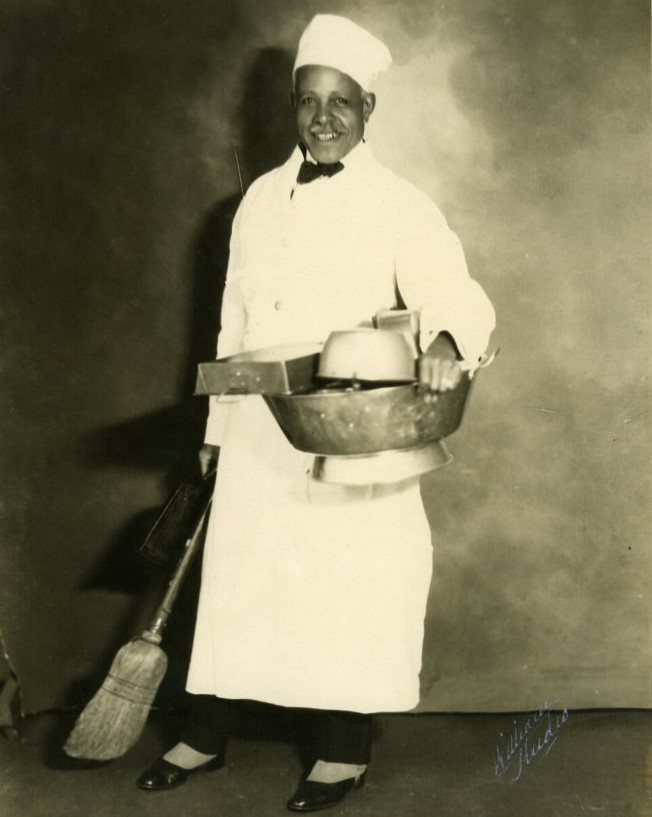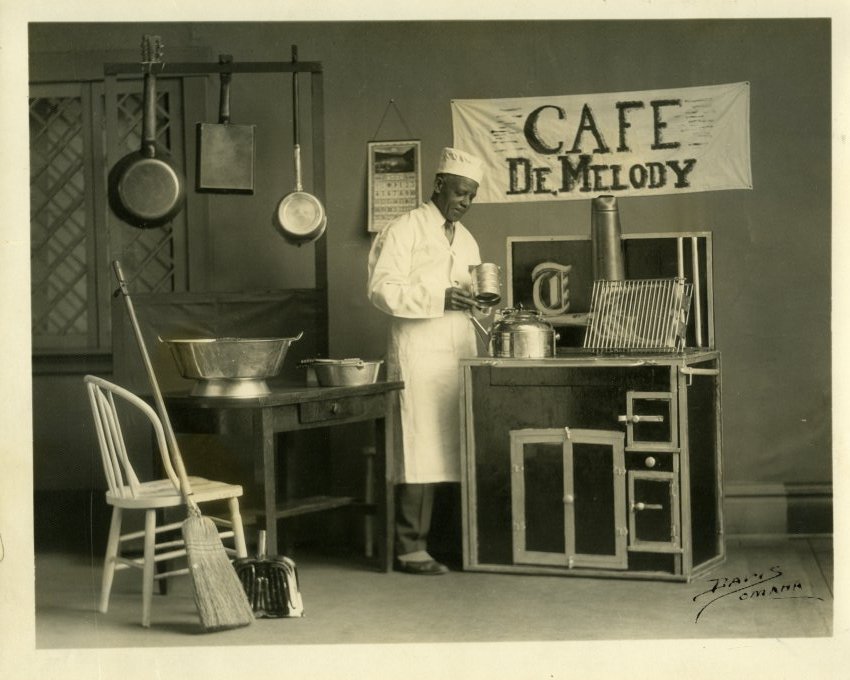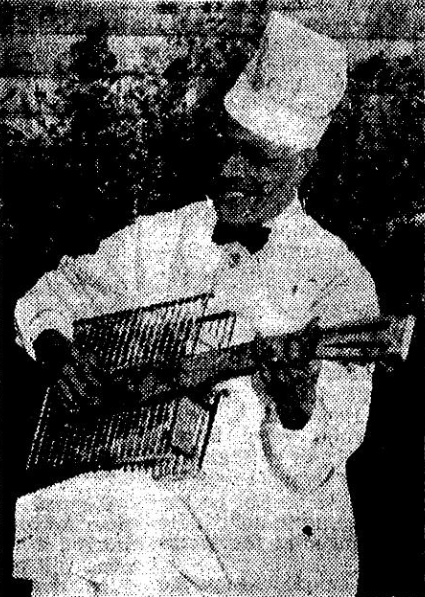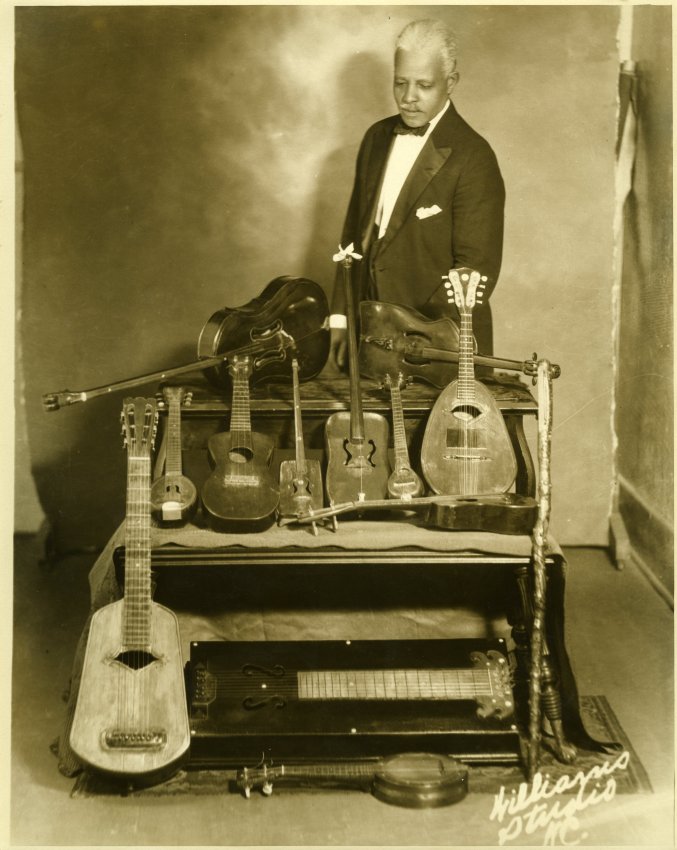By: Tara Spencer
There’s something about the dainty, plucky sound of a ukulele that immediately puts one at ease. Perhaps it’s the association with Hawaii—a paradise on Earth—or the often soothing voices that accompany it, such as Israel Kamakawiwo‘ole and Queen Liliʻuokalani, the last monarch of the Hawaiian Islands.[1]
Simply put, it’s hard to be in a bad mood once you hear those sweet tones.
Over the years, the ukulele has been considered a simple, lesser instrument by some musicians and critics. Others consider it an absolute joy, and therefore perhaps the best instrument to play. George Harrison once wrote “it is one instrument you can’t play and not laugh.”[2] Music that can affect moods in such a way is bound to have an impact that spread.
One man who found the allure of the ukulele appealing was New Orleans-born, Omaha-based Joseph S. Thomas. Known as “Ukulele Joe,” Thomas worked for the Union Pacific Railroad as a private chef to many of the higher-ups, including Carl R. Gray, who ran the company as president and vice chairman for 17 years before retiring in 1937.[3] It was even reported that he had earned a written stamp of approval from Queen Alexandria (sic) of Denmark.[4]
Besides his day job cooking for U.P.’s senior administrators on private railcars, Thomas was a musician, singer, and songwriter. During his travels with the company, he was a frequent visitor at radio stations along their routes, appearing on airwaves across the country playing a ukulele or a “one-stringed violin.” One of his most popular songs seems to have been “When the Morning Glory Climbs Up To My Window,” written about the twining, horn-shaped flowers that grew outside his North Omaha home.[5] Other songs attributed to him include “Ukulele Joe’s Big Parade,” a song for children, and “Oleomargarine Maid,” which one article said was “dedicated to housewives.”[5]

His combination of talents earned him the moniker “the singing chef.” He even turned his entire home kitchen into an impromptu concert hall. One excerpt from the California Eagle—a Black-owned newspaper in Los Angeles, California, published from 1879-1966—wrote that he sent “season’s greetings from Café De Melody, 2711 N 28th St.” That address was listed as his home in an Omaha World-Herald clipping.[7]

The mention of his name in newspapers outside his hometown is proof of Thomas’ widespread appeal. He seems to have been especially popular on the Pacific coast radio programs, with credits including WHT Chicago, KFH Wichita, KSL Salt Lake City, KHQ Spokane, KGW Portland, KNX Holloywood, KCNR Santa Monica, and KGO Oakland.[8] He also played some live shows, such as one at Iron County Hospital in Utah, where he entertained residents with original compositions. According to the Iron County Record in 1930, “Ole Uncle Johnson” was a particular hit with the crowd.
Thomas even had some famous friends, such as Lincoln Perry, aka Stepin’ Fetchit, a successful vaudevillian, film actor, and tap dancer. According to a society blurb in The Omaha Guide in August 1937, Fetchit even visited Thomas at his home for some time. It was reported he enjoyed his time in Omaha so much that he was “planning to return in the near future,” though I was unable to find evidence he ever did.
Despite Thomas’ famous friends and seeming renown, information on this impressive man was scant. Much of what I could find was largely published in Black-owned papers, as well as a few Omaha World-Herald pieces. One slice-of-life read from the World-Herald on August 26, 1928, helps frame Thomas’ world and helps bring him to life.
The story opens with “Jazz served ‘a la carte’—red hot from the pots and kettles of ‘Ukulele Joe’s’ musical kitchen—that’s the newest in music for those who like novelty with their tunes.” Thomas’ kitchen was stocked with “ukulele pots, pans, and other culinary musical ‘pipes.’” These culinary instruments reportedly cost nearly $1,000 and were made by the music man himself. (Another talent unlocked.) Even the kitchen range included a complete miniature organ. Naturally, his menus had musical themes, such as “Hawaiian dreams au gratin” or “Swanee River en caserole (sic).”

This peek into Thomas’ world of food, music, and creativity gives us the smallest glimpse into the life of a man who certainly made quite an impact in his time.
According to his obituary, published in the Omaha Star on Friday, May 5, 1950, Thomas died April 28, 1950, at “a local hospital.” He was survived by his wife, Sally Mae Thomas, and daughter, “Mrs. Frances Overby.” His brother, D. Warren Thomas of Chicago, was also listed and his funeral was at St. John A.M.E (African Methodist Episcopal) Church and was buried at Forest Lawn Cemetery. He was 72 when he passed.
Interested in learning more stories about essential workers who have made a difference throughout Omaha’s history? Visit us at the General Crook House Museum – our holiday decorations and exhibit “Highlighting Our Heroes” will be on display through Jan. 13. Each room of the house celebrates dedicated Omahans who have worked to improve our community in industries like education, medicine, transportation, social justice, delivery services, and more!

[1] Recker, Jane. “How the Music of Hawai’i’s Last Ruler Guided the Island’s People Through Crisis.” Smithsonian Magazine, 2019. Accessed 1 December 2022. https://www.smithsonianmag.com/smithsonian-institution/how-music-hawaiis-last-ruler-guided-islands-people-through-crisis-180971783/.
[2] Gioia, Joe. “The Curious Rise and Fall (and Rise Again) of the Ukulele in American Pop Music. Magellan.com. 8 July 2020. Accessed 1 December 2022. https://www.magellantv.com/articles/the-curious-rise-and-fall-and-rise-again-of-the-ukulele-in-american-pop-music.
[3] “Joe Cooks a Sweet Meal.” Omaha World-Herald. 26 August 1928. p.3.
[4] “You and Your History.” The Omaha Star. 31 March, 1976. p. 3.
[5] “Gray to Quit Helm of Union Pacific: President Since 1920, He Will Step Aside Oct. 1 at Age of 70 and Be Vice Chairman.” New York Times. 13 April, 1937. p. 37.
[6] “Ukulele Joe – Singing Chef.” Omaha World-Herald. 11 September 1932. p. 4.
[7] Ibid.
[8] “Radio Artist Sends Greetings.” California Eagle. 28 December 1928. Accessed 1 December 2022 https://z-upload.facebook.com/groups/1681787125444102/search/?q=ukulele%20joe.